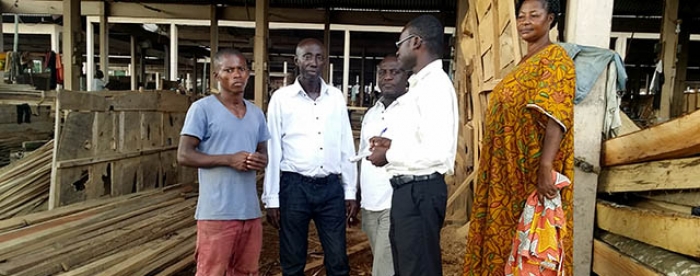News
Our stories ... ...

Ghana - 18 January, 2016
Artisanal millers who have been trained to use legal equipment in wood processing have appealed to the Government of Ghana to grant them access to timber concessions to enable them produce legal lumber for the domestic market.
The request comes amidst concerns from Ghana’s Forestry Commission (FC) about the high level of illegal wood from chainsaw operators on Ghana‘s domestic market which is estimated at about 80 percent.
The appeal was made during a working tour of Small and Medium Forest Enterprises (SMFEs) by the Timber Legality Compliance and Advocacy Project (TILCAP) team last year to ascertain their ability to comply with Ghana’s Legality Assurance System (LAS) as enshrined under the Voluntary Partnership Agreement (VPA) and the Forest Law Enforcement, Governance and Trade (FLEGT).
During the tour which begun on September 2nd last year and is still on-going, access to legal timber emerged as the main stumbling block to the adoption of Ghana’s LAS by SMFEs.
The Sankore Artisanal Millers Association made up of former chainsaw millers who ditched their chainsaws for the Wood Mizer following an intensive education on the negative impact of chainsaw milling on Ghana’s forest cover by the Chainsaw Milling (CSM) Project lamented their inability to access timber for their work on a regular basis. Both TILCAP and the CSM Project are being implemented by Tropenbos International (TBI) Ghana with funding from the European Commission.
The association which was constituted in 2013 and has been sourcing timber from Timber Utilisation Contract (TUC) holders in the Brong-Ahafo Region mentioned among other things the delay in the supply of timber to the association after a request has been made to the TUC holders and documentation has been finalised as a major hindrance to their work. This leads to their equipment lying idle for long periods of time thus depriving association members of work and a regular source of income.
Similarly, Rabwood Enterprise at Akrodie in the Brong-Ahafo Region, a registered artisanal milling enterprise, identified lack of access to timber concessions to produce legal lumber for the domestic market as a major stumbling block to their work and appealed for help in this dimension.
Other companies which were visited by the project team such as the Yunus-Kam Ventures in the Northern Region, the John Red Enterprise in the Brong-Ahafo Region, the Sungumo T Enterprise in the Upper West Region, the Asnata Enterprise in the Greater Accra Region, the Master Win Furniture and Building Works in the Volta Region and the Jesclan Art and Craft Company Limited in the Eastern Region all admitted getting access to legal lumber for their work was a big challenge due to the inadequate supply of legal lumber on the domestic market.
The three companies that were not faced with this challenge during this particular working tour were the Woodlow Company Limited and the PAYAB Company, both registered sawmill companies in the Assin Fosu District of the Central Region who had their own TUC areas where timber is harvested and processed for onward supply to the domestic market, and Tornado Woodworks, a registered artisanal milling enterprise which sources its lumber from concessions of some members of the Ghana Timber Association (GTA) at the Juaso Forest District.
Some of the SMFEs who were visited by the project team also made a suggestion that government should subsidize the cost of acquiring legal lumber from saw millers while tax on the importation of lumber should be waived to enable individual trade associations to import some and sell on the domestic market at an affordable price to SMFEs.
They also recommended that the Artisanal Milling Concept should be up-scaled nationwide to make legal lumber more available on the domestic market while government considers creating a lumber depot in the northern sector to enable SMEEs in the area have access to legal lumber.